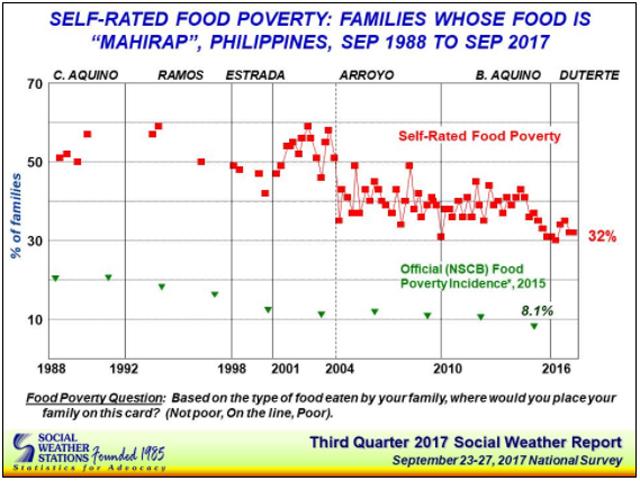Self-rated poverty rises to 47% in Q3 —SWS
Self-rated poverty among Filipinos has risen to 47 percent in the third quarter of 2017, up by three percentage points from 44% in the second quarter, according to the latest survey of pollster Social Weather Stations.
In its survey report, posted on December 1, SWS said that the figure would translate into an estimated 10.9 million families considering themselves poor.
SWS's June 2017 survey on self-rated poverty (families considering themselves as Mahirap or Poor) was at 44% or an estimated 10.1 million families.

The new figure follows nine consecutive quarters of either steady or declining self-rated poverty rates, which only ticked upward again between December 2016 and March 2017, or from 44 percent to 50 percent.
In its March survey on self-rated poverty (families considering themselves as Mahirap or Poor), the SWS found that around 10.1 million families rated themselves as poor.
Meanwhile, an estimated 7.4 million families, or 32 percent, consider the food their family eats as "poor." The figure has remained the same from June 2017 but is slightly lower than March's 35 percent. The SWS calls this food-poverty.
Self-rated food-poverty in the country averaged 31 percent in 2016 and 35 percent in 2015, it said.
The survey also asked its 1,500 respondents if they have ever experienced "not being poor," and found that 36 percent of Filipino families overall have "always been poor."
This translates to 75 percent of self-rated poor families saying they have always been poor, while the other 25 percent of the group said they had not been poor sometime in the past.
As for the part of the population that does not consider themselves poor, the SWS learned the division was in clean halves—50 percent have been poor sometime in the past, and the other 50 have always lived in poverty.
This supposedly means that 25 percent of Filipino families overall have never been poor.
The latest study was done from September 23 to 27 this year, using face-to-face interviews of 1,500 adults (18 years old and above) nationwide, with sample distribution of 600 in Balance Luzon, and 300 each in Metro Manila, Visayas, and Mindanao.
It has a sampling error margins of ±2.5 for national percentages, ±4 for Balance Luzon, and ±6 each for Metro Manila, Visayas, and Mindanao.
The SWS said it will also release reports on Filipino families' transition in and out of poverty and on transportation costs. —Nicole-Anne C. Lagrimas/LBG, GMA News



